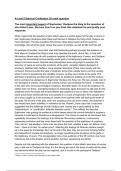A-Level Classical Civilisation 30 mark question
The most important aspect of Sophocles’ Oedipus the King is the question of
who killed Laius. Discuss how true you think this statement is and justify your
response.
While I agree that the question of who killed Laius is a central aspect of the play in terms of
plot, Sophocles introduces other ideas and themes in Oedipus the King which I believe are
more important. The play questions 5th-century ideas about seers and the quest for
knowledge, the will of the gods versus the power of mortals, as well as fate and free will.
An example of another, more vital, idea that Sophocles perhaps prompts the audience to
think about in Oedipus the King is what truly operates the world: divine fate, or free will?
5th-century Athens was rife with questions targeted at the legitimacy of seers, and Oedipus’
journey into discovering his true identity would push a contemporary audience to delve
deeper into these issues. Sophists and philosophers were using logic to question the
accuracy of seers as well as the existence of the gods. Jocasta’s blatant disregard of
prophecy, matched with Oedipus’ more reluctant dismissal of fate, links closely with the
confusion that surrounded the idea of prophecy at the time; people had a common anxiety
when it came to questioning the reliability of seers, as they were linked to the gods. The
dismissal of prophecy and fate had been seen as dangerous leading up to the 5th century,
and is portrayed as dangerous in Sophocles’ Oedipus the King, too. We see Jocasta, bold in
her disregard of oracles, announcing ‘nothing human can penetrate the future’, in reference
to the seer who announced Oedipus’ prophecy. She later states ‘So much for prophecy. It’s
neither here nor there’, prompting Oedipus to reluctantly agree (however he still asks for the
shepherd whom he hopes will reveal whether the prophecy is true or false). Her disbelief in
seers would have stirred both fear and curiosity in a crowd of Sophocles’ time, people were
all at once caught up in the scorning of oracles from sophists while still fearing the wrath of
the gods. By the end of the play, when the prophecy turns out to be correct, the audience’s
fear would have been solidified. In reference to this, Robert L.Kane says that ‘it has been
suggested that the sufferings of both Oedipus and Jocasta are in part justified by their
"blasphemous” or “unorthodox” attitudes towards oracles’1. This reflects the idea that
Sophocles’ was guiding his audience to think deeper about the current disbelief in prophecy
because it could lead to disastrous consequences. The chorus is used as an instrument that
repeatedly showcases the feelings of an Athenian 5th-century audience, continuously
expressing confusion and fear when faced with the question of the legitimacy of prophecy.
They call out: ‘but whether a mere man can know the truth, whether a seer can fathom more
than I - there is no test, no certain proof’: reflecting the feelings of Athenian citizens caught
up in the quest for knowledge. But, by the end of the play, they too are back to being fearful
and respectful of oracles and prophecy, no longer questioning the existence of the gods or
the legitimacy of seers. This encapsulates how a true audience of the 5th century may have
collectively felt at the theatre: at first doubtful, but then questioning and afraid.
Despite not fully agreeing with the statement, the question of who killed Laius does of course
play a vital role in Oedipus the King. It is the driving plot point, the basis of which all the other
key elements within the play can be explored, and is crucial in the portrayal of Oedipus’
1
Robert L. Kane, Prophecy and Perception in the Oedipus Rex




